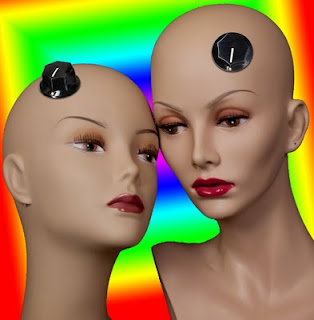Intellectromagnetic Spectrum
 Back in the mid-nineties I read an interesting post to a Usenet group (remember them?) about a psychological condition that apparently more people suffered from than was generally thought. The gist of it was "Are you lonely? Are you this? Are you that? If so you may be suffering from the other..."
Back in the mid-nineties I read an interesting post to a Usenet group (remember them?) about a psychological condition that apparently more people suffered from than was generally thought. The gist of it was "Are you lonely? Are you this? Are you that? If so you may be suffering from the other..."This instantly started ringing bells. Could this be why I'd always felt that I was a bit, well, rubbish when it came to dealing with people and life? Why I rarely seemed to find myself in a successful relationship?
However, as was so often the case on Usenet, this interesting post was immediately shouted down as being a load of old mumbo-jumbo dreamed up by inadequates to give themselves legitimacy. Amongst the more typical of the responses was:
Will you kindly take your quack psychoanalysis, your novice Neuro Linguistic Programming techniques and your painfully inadequate hypnotherapeutic attempts and ram them where the sun don't shine?I forgot about it and if anything felt a little ashamed that I'd been taken in, even for a few minutes. A pity, because aside from one or two exceptions, the initial message had seemed to describe me to a T.
Some time later in the early years of the 21st century the diagnosis of Asperger Syndrome (AS) entered the public consciousness more fully (partly thanks to The Curious Incident of the Dog in the Night Time) and could be discussed online without belligerent fuckwits leaping down your metaphorical throat. I read up on it and, to quote Jerome K Jerome "...before I had glanced half down the list of 'premonitory symptoms,' it was borne in upon me that I had fairly got it. "
Albeit perhaps in a mild form, although it was difficult to tell. I'd been dealing with the way my brain functioned all my life and had naturally developed a number of coping strategies. I'd become quite adept at pretending to be normal. It's true that I had to consciously make an effort to do things that seemed to come naturally to some people, but from the outside of course there was no appreciable difference.
I discovered a test online, which seemed to confirm my self-diagnosis (although of course I was still wary of the Jerome K Jerome Effect I alluded to above whereby reading up on the symptoms of something convinces you you're suffering from it). The only major symptom described that gave me pause for thought was the alleged "lack of empathy" or "difficulty reading people" that was apparently a shoo-in for being diagnosed with AS. I didn't think I suffered from this at all.
If anything I suffered from the opposite - often I worried so much about what other people were thinking or feeling that I could be frozen into inactivity. I was sometimes able to second guess people with uncanny accuracy. This constant awareness of the state of other minds sometimes got too much. This alone seemed to enough to make me question whether I was in fact suffering from AS at all.
That is until recently, when I read about a new theory that put forward the proposal that, far from lacking empathy, people with Aspergers feel other people's emotions far too intensely to cope, and therefore end up shutting their feelings down.
This was more like it. It was exactly how I would have described my feelings in some circumstances, and reading this felt as if the last piece of the puzzle that was me had been slotted into place.
The discovery, the naming, of my condition made me feel a lot better. Suddenly I knew that I wasn't like this simply because I was a crap person, but because my brain worked in a slightly different way from other people's.
But of course we're all different - even people who are "normal". If there is a spectrum upon which Aspergers and Autism sit then surely it's part of the same continuum upon which you'd also find the neuro-typical. Furthermore, neuro-typical probably describes a range of settings within the human mind.
A consciousness is a complex multi-dimensional construct with billions of variables, and there is probably a meaninglessly high number of combinations of these variables, each of which we would call a viable human mind. Just because we label some of these as "neuro-typical" and others "autistic" doesn't mean that any of them are broken.
Especially if from the outside there's no appreciable difference.



Comments